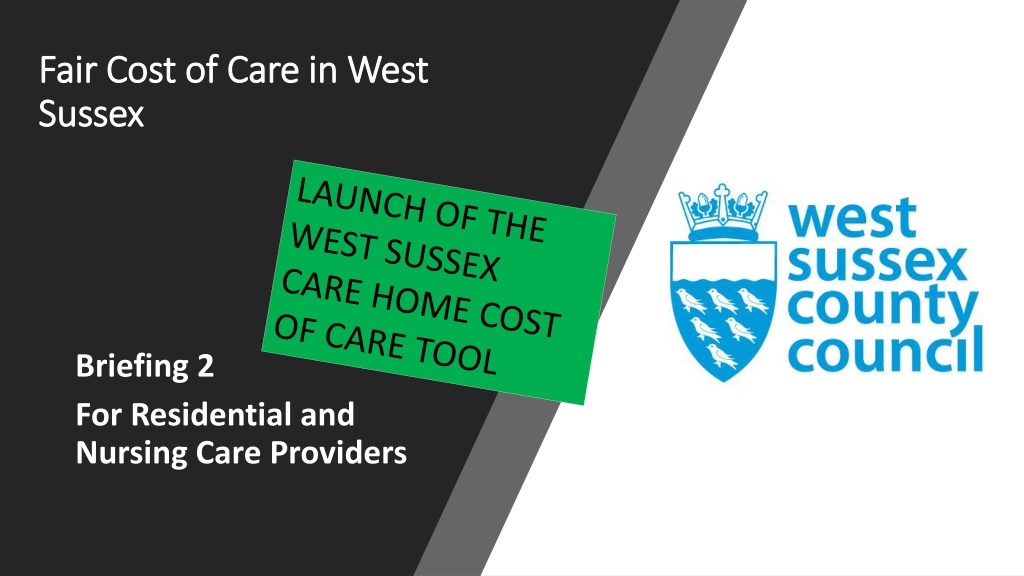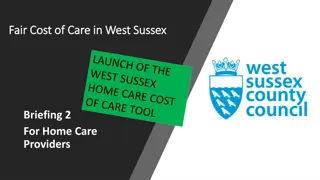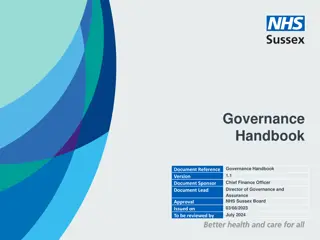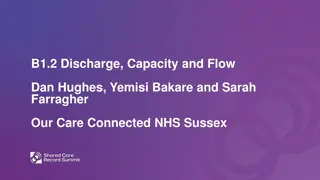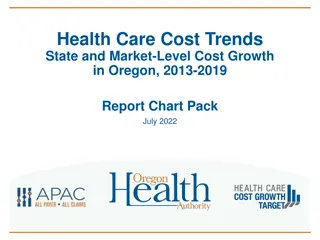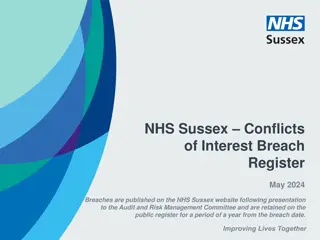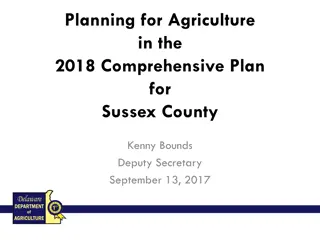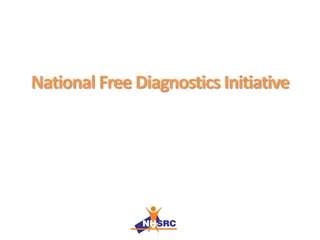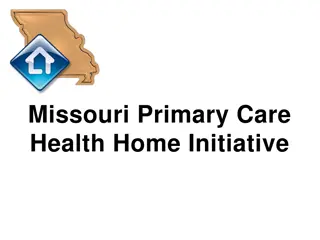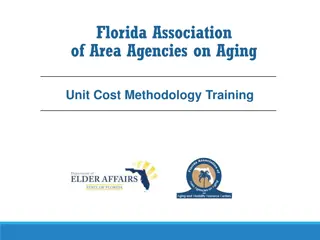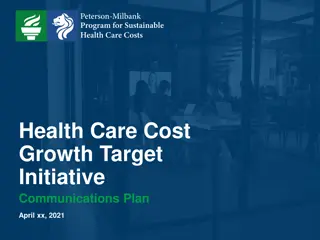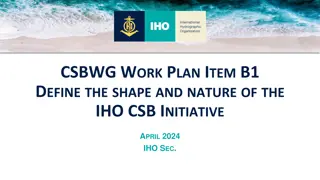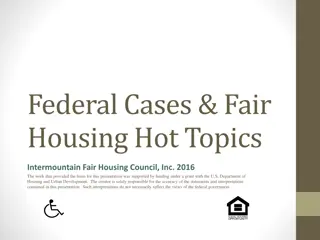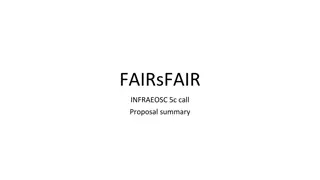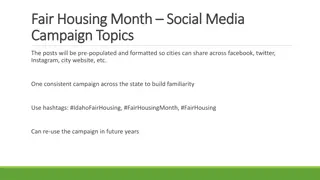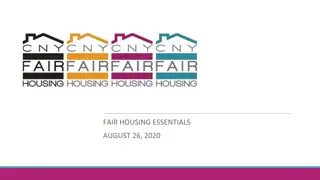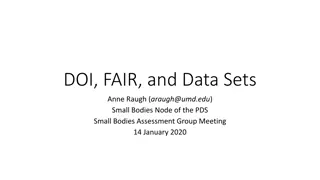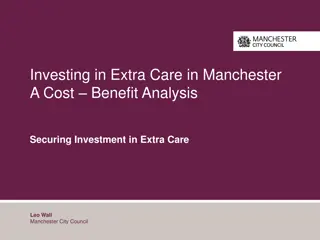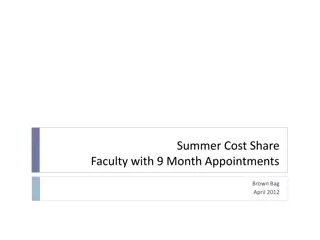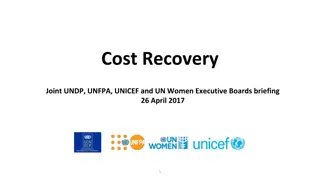Overview of Fair Cost of Care Initiative in West Sussex
The Fair Cost of Care initiative in West Sussex aims to address the challenges faced by care providers in a shrinking budget environment. Local authorities are required to conduct a Cost of Care Exercise and develop a Market Sustainability Plan to ensure fair costs for care services. The government's White Paper on Adult Social Care Reform emphasizes the need for equitable pricing for self-funders and those supported by LAs. By sharing cost data and implementing evidence-based tools, the initiative aims to create a sustainable and fair care market in the region.
Download Presentation

Please find below an Image/Link to download the presentation.
The content on the website is provided AS IS for your information and personal use only. It may not be sold, licensed, or shared on other websites without obtaining consent from the author. Download presentation by click this link. If you encounter any issues during the download, it is possible that the publisher has removed the file from their server.
E N D
Presentation Transcript
Fair Cost of Care in West Fair Cost of Care in West Sussex Sussex Briefing 2 For Residential and Nursing Care Providers
Well give you a quick summary of the first briefing which went into more detail about the overall background. We officially launch the cost of care tool here and provide details about how to complete and deadlines for completion In this briefing We share with you Frequently Asked Questions about the cost of care generally and some of the specific questions raised by home care providers about the cost tool being used We ll tell you more about the Market Sustainability Plan we want to co-design with you which aims to tackle important issues facing us in West Sussex
Care markets across the UK have struggled as Local authorities (LAs) have needed to ensure rates are affordable due to shrinking budgets Providers have worked in a challenging market with increasing cost pressures Self-funders often pay higher rates than those negotiated by LAs and subsidise providers costs The Govt White Paper (December 21) People at the Heart of Care: Adult Social Care Reform aims to ensure that people who self-fund their care do not have to pay more than local authorities for the same service Quick Summary of Briefing 1 The Govt requires all local authorities to: Carry out a Cost of Care Exercise Develop a Market Sustainability Plan The outcome of the cost of care exercise and a draft plan need to be submitted by 14th October 22 (with the developed plan submitted in February 23) It also introduces a new Market Sustainability and Fair Cost of Care Fund - 600m nationally for each of the next two financial years. Completion of the Cost of Care Exercise is a condition of receiving any funding which can be used to support local care costs.
Its an evidence-based approach where providers share the costs they face in delivering home care & residential or nursing care It recognises the real cost pressures facing providers as well as the reasonable returns needed from operations and capital What is the Cost of Care exercise? It uses cost tools that have been developed in consultation with providers and LAs which ensure a consistent and a balanced approach to establishing a fair cost. We will be using the ARCC Dom Care Tool see slides below for more details and links to access the tool. The upper quartile, median and lower quartile costs in each of the markets are submitted to govt, with the median referred to as the Fair Cost of Care Each LA develops a plan to look at the impact of market changes over the next 3 years and how to make local markets more sustainable LAs will also have to set out by February 2023 how they will move towards the fair cost of care.
3 questions 3 questions our Market Sustainability Plan needs to answer Sustainability Plan needs to answer our Market What is the What is the West Sussex West Sussex Market Market Sustainability Sustainability Plan? Plan? 2. What changes are needed to sustain the business of caring in West Sussex? 3. What action do we need to take? 1. What are the key issues that need to be tackled? Recruitment and retention? Sharing information about customer needs and complexity? Data on county demographics? Commissioning with the council? Planning the direction the market needs to take e.g. stronger focus on supporting people at home, greater focus on complex needs/dementia within residential? Look out for more announcements in July ..
WSCC has officially launched the tool on 4th July. When do we need to complete the cost of care tool? It s available now and should be completed by 3pm Monday 1st August 2022 Please send us your response as early as possible before the closing date so that we can review it with you in the event of any queries. Don t forget to ask for guidance on issues you re facing when you start to complete the tool contact us on costofcare@westsussex.gov.uk
How can I get How can I get hold of the hold of the cost tool? cost tool? Residential and Nursing Tool Web based tool Care providers need to register first Use this link to register : https://fcoc.carecubed.org/register Any problems? Check this How To video guide for registration and creating an account
Cost of Care Frequently Asked Questions
Index of Questions Slide 10 - Who is this aimed at? Slide 24 Who can support me? Slide 11 Standard and Enhanced Care Slide 25 - Who needs to complete the information? Slide 12 Supported Living/Extra Care in Scope? Slide 26 - More than one local authority purchasing from one location Slide 13 Just for providers commissioning by West Sussex? Slide 27 What period of time should the information be related to? Slide 15 What s the goal of this? Slide 28 Can I just put in general staff cost information? Slide 16 How have other providers responded to this? Slide 29/30 Return on operations and capital Slide 17 Is this is about reducing the price providers can charge? Slide 31 Property valuation Slide 18 Why should we share our costs with the council? Slide 32 Most useful tip for inputting costs? Slide 19/20 - How is this data going to be used? Slide 33 Accounting for PPE costs Slide 21 How could using the cost tool benefit me? Slide 34 - If I submit costs, will the council pay them? Slide 22 It looks complicated .. Slide 35 - Handling different types of pay uplift for staff Slide 23 What if I struggle to use the tool? Slide 36-40 Useful information
Residential and nursing homes (+65) across England Who is this Who is this aimed at? aimed at?
The government guidance has used terms which are not necessarily familiar to those in the social care world. The cost tool has used a more traditional definition by referring to: The guidance The guidance refers to refers to standard and standard and enhanced enhanced care care what does that does that mean? mean? Standard residential Standard nursing Residential with dementia (or enhanced) Nursing with dementia (or enhanced) what
Supported living is out of scope Is my supported living service in scope? There are a couple of people over 65 living there . Extra care is out of scope although if you are a dom care service working in the community and also provide services within an extra care scheme, all of these services are within scope Check out the official guidance on the next page which helps to define what s in and what s out of scope If in doubt, contact us on costofcare@westsussex.gov.uk costofcare@westsussex.gov.uk
We are asking all providers in West Sussex to complete the tool If you are a provider of 18+ home care or 65+ residential/nursing homes Regardless of whether or not you are currently providing services commissioned by West Sussex County Council You may in fact have a business which is fully focused on self funders. Is this just for providers receiving business from WSCC? This will help to get a wide picture of the real costs facing providers in the region And make sure that the information we base our plans on is accurate
Example 1: A care home that supports older people and has a resident who is aged 60 in scope. Example 2: A care home that supports working age adults and has a resident aged 69 out of scope. Example 3: A domiciliary care provider based in an extra care housing scheme that delivers the majority of their care in that scheme but some in the local community out of scope. Example 4: A domiciliary care provider delivers a range of community-based support (sitting services, live in support, domestic support), but the vast majority of the support they provide is for people aged over 18+ and consists of long term care, with a regular pattern per week, consisting of relatively short visits in scope.
The government would like to Reduce the differential between the LA rate and the self-funder rate Bolster market sustainability including funding, investment, support and training for staff What s the goal What s the goal of all this? of all this? Local authorities would like to receive more funding to be able to pay sustainable rates in the care market Providers would like to have a sustainable business and be able to charge rates that cover their costs and a return on investment
The Care Provider Alliance has said it is critical that providers engage in the Fair Cost of Care data collection exercise to determine the actual cost of providing high quality care nationally to see the appropriate level of funding from the government. This is a one-off chance to evidence the cos of provision locally and nationally to compensate providers appropriately against the reforms to be introduced which will see those self- funding their own care to access the local authorities rate paid for care. How have How have other other providers providers responded to responded to this? this? Professor Martin Green, Chief Executive of Care England & Dr Jane Townson, Chief Executive of the Homecare Association are encouraging all providers to take part in this national cost of care exercise and inform their local authorities of the true costs of delivering social care.
This is about This is about reducing the reducing the price price providers can providers can charge, isn t charge, isn t it? it?
The government is trying to ensure that providers have their actual costs covered in the rates paid by local authorities as well as self- funders Why should Why should we share our we share our costs with costs with the council? the council? Providers have often said that local authorities aren t considering the full costs that they have to pay so this is a major opportunity to make sure that the real costs of care are known and taken seriously
Shouldnt I Shouldn t I be suspicious be suspicious of how this of how this data is going data is going to be used? to be used?
How will How will the data I the data I provide be provide be used by used by WSCC? WSCC?
Help to ensure sustainable rates in West Sussex How could using the cost tool benefit me? But also Modelling the impact on your bottom line of changes to your staff profile and/or changes to what you pay for travel (e.g. increased travel time or mileage rate) Modelling different scenarios e.g. taking on a new area of business in a more rural part of West Sussex
It looks more complicated than it is It looks complicated looks like I need a qualification before I can use it! Good advice is to look at the tool first and see what information you need to gather before you try to input your costs There s lots of guidance as you work your way through the tool If you get stuck or find something difficult to figure out, use one of the sources of support you can find at the end of this briefing
What if I struggle What if I struggle to know how to to know how to use the cost use the cost tools? tools?
We are very pleased to announce that we have appointed Laing Buisson to work with us to analyse the data and produce our cost of care report. You may already be familiar with Laing Buisson as a leading business intelligence provider working in the health, care and education sectors. Laing Buisson has a great deal of experience working with providers on the cost of care, producing annual market reports for adult specialist care, care homes and many other areas. Laing Buisson will: Laing Buisson - Additional support Contact all providers by telephone during July to encourage providers to participate Provide guidance, assistance and advice so that providers can complete the cost of care exercise including talking through how to fill the tools in (9am - 5pm, Monday to Friday by telephone, email or Teams call) Contact providers after tools have been returned Laing Buisson has a team that will be verifying the returns and will contact you if any anomalies are found or to support you if the toolkit hasn't been filled in correctly. Laing Buisson can be contacted via Estelle O Neill (Senior Researcher) on 01268 767292 Email: estelle.oneill@laingbuisson.com
Who needs Who needs to complete to complete the the information? information?
My care business provides care from a single location but to more than one local authority. For care homes: Providers should provide the cost of care data regardless of which local authority is funding the placements to produce a single cost of care which is agnostic of funder How should I treat this in the West Sussex cost of care response? Providers only need to provide a response to the host authority
What time period should the information I provide relate to? The most important principle is that costs & information should be based on actuals and not an assumption about what costs are. We would like all providers to use annual data and annual costs which are based on 21/22 actuals so that we have a consistent approach across the board. However, the tool allows you to add an uplifted figure for April 22 where you can reflect any actual changes to your cost base which have taken place so far in the year. Please note these need to be actuals too and not based on something which you think is quite likely to happen.
The tool is designed to be completed with details of costs Not just generic staffing costs But costs of senior carers, carers, nursing staff etc Can I just put in Can I just put in general general cost information? information? cost This helps to make sure that the West Sussex Cost of Care exercise is real and based on actual costs, not generalised information
This is a gross profit or surplus number the gross amount before tax. What does Return on Operations mean? Care Providers can provide this as: a % markup on operating costs identified in the expenditure tab OR as a per resident per week value within the FCOC tool. Return on operations can be calculated as a percentage markup on operations and head office costs. These are operating costs excluding Interest, Tax, Depreciation, Amortisation and Rent (ITDAR) which is captured separately as part of Return on Capital. Return on operations will consider operational risks such as drops in occupancy, inflationary pressures, a provision for future investments (where not capitalised) and dividend payments. For Not-for-Profit organisations this should consider a surplus in line with their reserves policy.
Investment by nature involves risk. The cost of capital is the return that investors require to invest in a business. Return on capital is a judgement rather than a hard science. What does Return on Capital mean? However, return on capital is an important consideration, as it is one of the main fixed costs in a care home and should include borrowing, interest, depreciation, cashflow funding, and capex etc. It should also include mortgage and rental payments where required. You can, like return on operations, provide this either: as a % of a property valuation as per the DHSC guidance (https://www.gov.uk/government/publications/market- sustainability-and-fair-cost-of-care-fund-2022-to-2023- guidance/annex-e-further-detail-on-return-on-capital-and-return- on-operations) OR as a per resident per week value if the property is rented
How should I complete the property valuation section? The Property Freehold Valuation section enables you to provide a recent property valuation. It is not mandatory. This is a valuation of the property and not of your care business A RICS valuation is a professional assessment of the market value of property or land, taking several factors into account. It is often carried out for mortgage purposes, financial matters, building insurance purposes or as part of a building survey to ensure that the property is a sound investment The guidance says that this should be a recent valuation carried out in line with RICS guidelines
You dont have to do it in one sitting What s the most useful tip for inputting my costs? But use the save button regularly!
We appreciate that providers may not have faced actual costs for PPE during 21/22 but will do in future. How For consistency, we are asking providers to take the following approach: should I account for PPE costs? Show the amount/volume of PPE used Populate the cost of care tool to state the amount of PPE you used per visit This will automatically calculate total PPE usage and give a factual measure of the volume of PPE used. In relation to the cost of PPE State the costs of PPE since April 2022 Both of these will enable the tool to capture the overall cost of PPE going forward
This exercise is about gathering the real costs that providers face in delivering their business It doesn t immediately establish a new price If I submit my If I submit my costs, will the costs, will the council start council start to pay them? to pay them? We re hoping that providers not currently being commissioned by the council will also submit their costs We ll be looking at the median costs of delivering care. This median is referred to by govt as the fair cost of care. We are able to remove outliers that are likely to skew the median The government will be asking (via our Market Sustainability Plan) how we plan to move towards the fair cost of care over a period of time
The homecare tool, for example, enables you to reflect different enhancements by job type/job role. We don t have a set We don t have a set uplift for weekend uplift for weekend rates as staff are paid rates as staff are paid differently depending differently depending on their qualifications. on their qualifications. But all staff are paid But all staff are paid either 50p or 1 extra either 50p or 1 extra per hour at weekend per hour at weekend and evenings. and evenings. If you pay enhancements dependent on other factors such as qualifications you will need to use an average across the relevant job roles Shall we just use Shall we just use averages based on the averages based on the total staff uplift? total staff uplift?
Valuable Valuable Sources of Sources of Help and Help and Information 1 Information 1 General Guidance on the Cost of Care Email WSCC with any queries at costofcare@westsussex.gov.uk DHSC publication Market Sustainability and Fair Cost of Care Fund General info General info Latest DHSC Guidance on the Market sustainability and fair cost of care fund 2022 to 2023
Valuable Valuable Sources of Sources of Help and Help and Information 2 Information 2 How to access the Residential and Nursing Tool Care providers need to register for this web-based tool via this link: https://fcoc.carecubed.org/register How To video guide for registration and creating an account An Overview of the Fair Cost of Care Tool for Care Providers - YouTube Residential and Residential and Nursing tool Nursing tool Support and guidance The provider s awareness pack is available by clicking here
marketsreform@dhsc.gov.uk Managed by Department of Health and Social Care (DHSC) This is the most appropriate helpdesk for any questions or clarification about the DHSC Guidance, funding conditions or wider charging reform. Helpdesk Emails MarketsandCommissioning@local.gov.uk Managed by CHIP and is likely to be of most benefit to local authority colleagues delivering cost of care exercises and seeking guidance, clarification and support. FCC@CareProviderAlliance.org.uk Managed by Care Provider Alliance and is likely to be of most benefit to provider colleagues participating in cost of care exercises and seeking guidance, clarification and support. CareCubed@iese.org.uk Managed by iESE, who have developed the Care Home Cost of Care Tool. This should be used for technical questions about the Tool and to provide feedback and suggestions. support@CostOfCareToolkit.co.uk Managed by ARCC-HR Ltd, who have developed the Domiciliary Care Cost of Care Tool. This should be used for technical questions about the Tool and to provide feedback and suggestions.
For your calendar For your calendar: West Sussex Events, guidance and support WSPiC Managers Forum 14th July 09:30-12:30 Field Place, Worthing https://goo.gl/maps/8UV729nfTrrYMusk8
